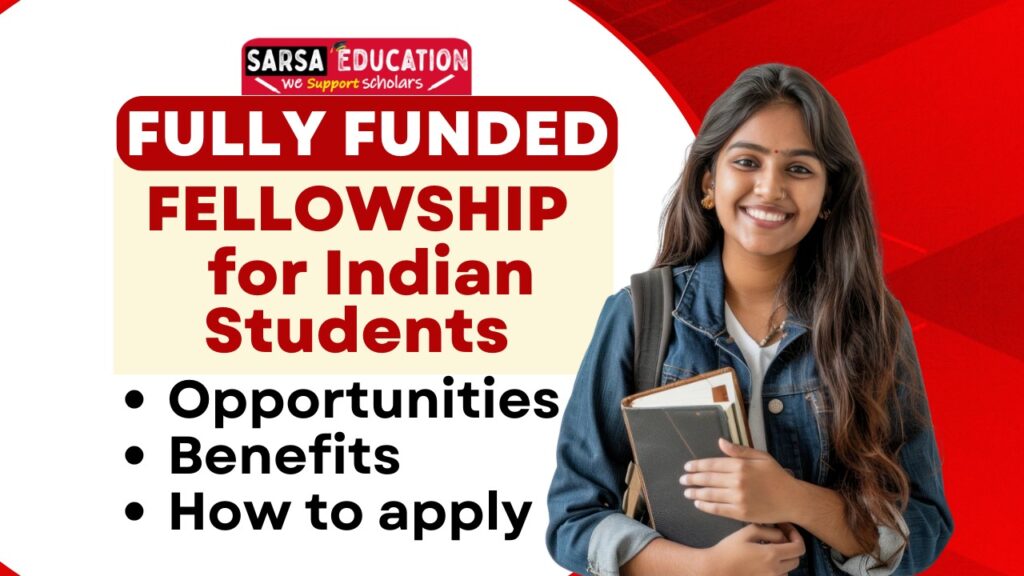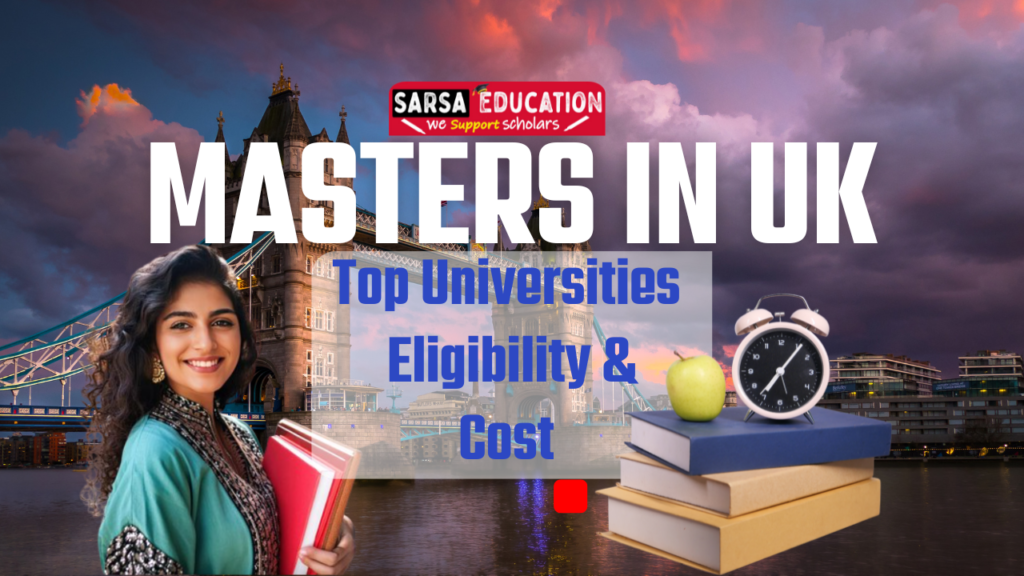Fully Funded Fellowship opportunities can be transformative for Indian students aiming to pursue higher education, research, or professional development abroad. These prestigious programs not only cover full tuition fees but also provide comprehensive support for living expenses, travel, health insurance, and research-related costs. Whether you’re a recent graduate seeking academic advancement, a researcher exploring innovative projects, or a young professional looking to gain global experience, fellowships are designed to remove financial barriers and empower talented individuals. In this article, we’ll explore some of the top fellowships available to Indian applicants, including their application processes, benefits, eligibility criteria, and answers to frequently asked questions. If you’re ready to take your next big step without financial stress, read on!
Contents
- What is a Fully Funded Fellowship?
- Why Indian Students Should Apply for Fully Funded Fellowships?
- Top Fully Funded Fellowships for Indian Students
- Eligibility Criteria for a Fully Funded Fellowship
- How to Apply for Fully Funded Fellowships
- Tips to Win a Fully Funded Fellowship:
- Benefits of a Fully Funded Fellowship:
- Fully Funded Fellowship in India
- Important links:
- Frequently Asked Questions(FAQs):
What is a Fully Funded Fellowship?
A fully funded fellowship is a scholarship or grant that covers all the major expenses related to education or research. This includes:
- Tuition fees
- Monthly stipend or salary
- Travel expenses (airfare, local transport)
- Accommodation and food
- Health insurance
- Research or project funding (in some cases)
These fellowships are usually offered by universities, governments, international organizations, and private foundations. They are highly competitive but offer unmatched opportunities for growth and global exposure.
Why Indian Students Should Apply for Fully Funded Fellowships?
India has a large pool of talented students, but many are held back by financial constraints. A fully funded fellowship can help you:
- Study at top international universities (Harvard, Oxford, MIT, etc.)
- Gain global work and research experience
- Expand your professional network
- Build a strong resume
- Contribute back to your country with international exposure
Top Fully Funded Fellowships for Indian Students
Here are some of the most popular and prestigious fully funded fellowship programs that Indian students can apply to:
1.Rhodes Scholarship (UK)
- For postgraduate studies at Oxford University
- Covers tuition, travel, and living expenses
- Highly competitive, focused on academic excellence and leadership
2. Fulbright-Nehru Fellowships (USA)
- For master’s degrees, research, or teaching in the USA
- Covers full tuition, travel, health, and living costs
- Ideal for professionals, researchers, and students
3. Chevening Scholarship (UK)
- UK Government fellowship for global leaders
- Fully funded master’s programs
- Focuses on leadership and networking
4. DAAD Scholarship (Germany)
- For master’s, PhDs, and research in Germany
- Full financial support and monthly stipend
- Available for many fields including engineering, arts, and social sciences
5. Commonwealth Scholarship (UK)
- For students from Commonwealth nations including India
- Tuition, airfare, and living allowance fully covered
- Offers both master’s and PhD programs
6. Erasmus Mundus Joint Master Degrees (Europe)
- Study in 2 or more European countries
- Fully funded tuition and monthly living allowance
- Offers unique cultural and academic exposure
7. Inlaks Shivdasani Foundation Scholarship
- For postgraduate study at top institutions in the US, UK, and Europe
- Covers tuition, living, and travel expenses
- Focuses on niche courses and creative fields
8. Tata Scholarship for Cornell University (USA)
- For Indian undergraduate students at Cornell
- Full tuition and support for the entire course duration
9. JN Tata Endowment Scholarship
- Partially and fully funded options
- Loan scholarship but with low-interest and support grants
10. Gates Cambridge Scholarship (UK)
- For master’s and PhD at the University of Cambridge
- Covers full cost including visa and flights
Eligibility Criteria for a Fully Funded Fellowship
While each fellowship has its own requirements, some common eligibility criteria include:
- Indian citizenship or residency
- Excellent academic record
- Proven leadership skills or community involvement
- Language proficiency (IELTS/TOEFL for English-speaking countries)
- Admission or conditional admission to the host institution
- Age limits (varies per fellowship)
How to Apply for Fully Funded Fellowships
- Research Thoroughly
Find fellowships that align with your goals, field of study, and academic level. - Prepare Documents
Most fellowships require:
- Academic transcripts
- Statement of Purpose (SOP)
- Letters of Recommendation
- Resume or CV
- Language test scores
- Research proposal (if applicable)
- Check Deadlines
Apply well before the deadline. Some programs start a year in advance. - Tailor Each Application
Customize your SOP and documents according to each program’s goals. - Prepare for Interviews
Some fellowships have personal interviews or video assessments.
Tips to Win a Fully Funded Fellowship:
- Start early and plan ahead
- Be honest and authentic in your SOP
- Show leadership and commitment to social causes
- Highlight your achievements with evidence
- Connect with past fellows for advice
- Practice mock interviews
Benefits of a Fully Funded Fellowship:
- Financial freedom to focus on learning
- International exposure and cultural exchange
- Networking with global scholars and experts
- Access to world-class resources and mentors
- Career boost and high employability
Fully Funded Fellowship in India
If you want to stay in India, there are fellowships like:
- Prime Minister’s Research Fellowship (PMRF) – For PhD in IITs, IISc
- Raman-Charpak Fellowship – Indo-French research collaboration
- Young India Fellowship (Ashoka University) – Liberal arts postgraduate diploma
- Teach for India Fellowship – 2-year teaching and leadership program
These programs also offer stipends, training, and mentorship within the country.
Important links:
Frequently Asked Questions(FAQs):
1. What is a Fully Funded Fellowship for Indian students?
A Fully Funded Fellowship is a financial aid opportunity where all expenses related to your academic or professional pursuit are covered. For Indian students, this often includes tuition fees, travel costs, living expenses, health insurance, and sometimes even research allowances. These fellowships are offered by governments, universities, or international organizations to support talented individuals in pursuing higher education or research abroad or in India.
2. Who can apply for Fully Funded Fellowships?
Indian students who have completed their undergraduate or postgraduate studies, or are currently enrolled, can apply for Fully Funded Fellowships. Some fellowships also support mid-career professionals, researchers, or those involved in social development work. Eligibility often depends on academic performance, leadership potential, field of study, and language proficiency (especially for international fellowships).
3. What are the benefits of Fully Funded Fellowships for Indian students?
The benefits include:
- Complete coverage of tuition fees
- Monthly stipends for living expenses
- Travel and visa costs
- Accommodation assistance
- Access to world-class education and research facilities
- Opportunities for networking and internships
In essence, a Fully Funded Fellowship removes the financial barrier and allows students to focus entirely on their academic or professional growth.
4. Which countries offer Fully Funded Fellowships to Indian students?
Countries like the USA, UK, Germany, Canada, Australia, Japan, and many European nations offer Fully Funded Fellowships. Examples include the Fulbright-Nehru Fellowship (USA), Chevening Scholarship (UK), DAAD Scholarship (Germany), and Erasmus Mundus (EU). These fellowships are designed to promote academic exchange and cultural understanding.
5. Are there any Fully Funded Fellowships available within India?
Yes, there are several prestigious Fully Funded Fellowships available within India. Examples include:
- Prime Minister’s Research Fellowship (PMRF)
- Raman Charpak Fellowship
- DST INSPIRE Fellowship
These fellowships support doctoral and post-doctoral research in top Indian institutions like IISc and IITs.
6. What fields of study are eligible for Fully Funded Fellowships?
Fully Funded Fellowships cover a wide range of disciplines including:
- Science, Technology, Engineering, and Mathematics (STEM)
- Social Sciences and Humanities
- Law and Public Policy
- Arts and Culture
- Environmental Studies
- Health and Medicine
Eligibility may vary depending on the fellowship program.
7. How can I find Fully Funded Fellowship opportunities?
You can find opportunities through:
- Official fellowship websites (e.g., Fulbright, Chevening)
- University scholarship portals
- Education fairs and webinars
- Government and embassy announcements
- Trusted educational platforms like Study in India, DAAD, or Campus France
Always verify the source before applying to ensure it is a legitimate Fully Funded Fellowship.
8. What are the general eligibility criteria?
While each program has specific requirements, common criteria include:
- Indian citizenship
- Strong academic background
- Language proficiency (IELTS, TOEFL, etc.)
- Letters of recommendation
- Statement of purpose
- Research proposal (for research-based fellowships)
Meeting these increases your chances of securing a Fully Funded Fellowship.
9. When should I start preparing for a Fully Funded Fellowship application?
Start preparing at least 8-12 months in advance of the application deadline. This allows you enough time to gather necessary documents, improve test scores (if required), draft essays, and request recommendations. Early preparation is crucial for competitive Fully Funded Fellowship programs.
10. Do I need work experience to apply?
Some Fully Funded Fellowships, especially those for leadership or mid-career professionals like Chevening or Hubert H. Humphrey, do require work experience. However, many academic fellowships like Fulbright-Nehru for students or DAAD for postgraduate studies do not mandate professional experience.
11. What documents are required for the application?
Typical documents include:
- Academic transcripts
- Updated CV/Resume
- Letters of recommendation
- Statement of purpose or motivation letter
- Language test scores (IELTS/TOEFL)
- Research proposal (if applicable)
- Passport copy
Make sure to tailor your documents to the specific Fully Funded Fellowship you’re applying for.
12. How competitive are Fully Funded Fellowships?
They are highly competitive due to limited slots and high global demand. Thousands of qualified applicants apply each year. That’s why it’s essential to present a strong academic profile, compelling essays, and clear career goals to stand out in Fully Funded Fellowship applications.
13. Can I apply for multiple fellowships at once?
Yes, you can apply to multiple Fully Funded Fellowship programs, as long as they don’t restrict simultaneous applications. Make sure to customize your applications to suit each fellowship’s goals and requirements.
14. Are Fully Funded Fellowships only for top-ranked students?
Not necessarily. While good academic performance is important, most Fully Funded Fellowships also consider leadership, community involvement, innovation, and potential to contribute positively to society. Holistic profiles often fare better than purely academic ones.
15. What is the selection process like?
Most Fully Funded Fellowships involve:
- Online application submission
- Shortlisting based on eligibility and merit
- Personal interviews (online or in-person)
- Final selection and offer letter
Transparency and merit-based selection are the cornerstones of most reputable programs.
16. Is there an age limit to apply for Fully Funded Fellowships?
Some fellowships do have age limits (e.g., 25–35 years for some leadership fellowships), while many academic ones are open to all age groups. Always check the specific eligibility criteria before applying to any Fully Funded Fellowship.
17. What happens after completing a Fully Funded Fellowship?
After completing your Fully Funded Fellowship, you often return to your home country or pursue further opportunities. Some fellowships require you to work in your home country for a specific duration, promoting knowledge transfer and development. Others may allow job searching abroad, depending on visa rules.
18. Do I need to return to India after the fellowship?
It depends on the fellowship. For example, Fulbright and Chevening fellowships usually require scholars to return and contribute to their home country. However, programs like Erasmus or DAAD may allow extensions or further study. Always review the post-fellowship obligations of your specific Fully Funded Fellowship.
19. Can undergraduate students apply for Fully Funded Fellowships?
While most Fully Funded Fellowships are for postgraduate, doctoral, or post-doctoral studies, some international fellowships and exchange programs (like the Global UGRAD or Mitacs Globalink) are open to undergraduate students from India. These often support short-term research or academic exchange.
20. What tips can increase my chances of getting a Fully Funded Fellowship?
- Start early and plan well.
- Maintain a strong academic record.
- Engage in extracurriculars and community service.
- Develop leadership and communication skills.
- Write a compelling SOP/Motivation Letter.
- Prepare thoroughly for interviews.
- Seek guidance from alumni or mentors.
Being authentic and passionate about your goals significantly boosts your chance of receiving a Fully Funded Fellowship.
For National/International Scholarship updates kindly join our WhatsApp channel
Follow the Sarsa Education channel on WhatsApp: https://whatsapp.com/channel/0029VaL9SgRAjPXJthnK9D0E
For regular Scholarship/Fellowship/Internship updates:
Join our Telegram channel: Sarsa Education






